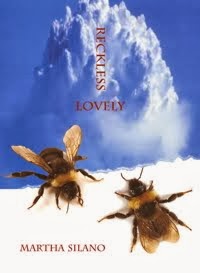
Tuesday, October 19, 2010
Space Alien Abducts Seattle Poet's Forthcoming Manuscript

Monday, October 18, 2010
Swag Dreams




I'm thinking magnets, keychains, bookmarks, & postcards of aliens, rocket ships, and flying saucers carrying my book around with them. If you're lucky enough to be heading to DC in 2011, or if you live near Seattle, then you're almost certain to land yourself some cool alien swag if you come to one of my readings.
Saturday, October 16, 2010
Paddling Around in the What-Makes-Us-Human Puddle

I came across a blog by a poet I'd never heard of. Her name is Stephanie Goehring. I seems she recently up and moved to Iowa to attend/teach at the Iowa Writer's Workshop in Iowa City. Here's her poem Epic, which I found at 42opus and really liked. But best of all, this photo of a chalkboard with her students answer to the question "What don't you like about poetry"?
Tuesday, October 12, 2010
Eng 101: Millions of Peaches, La Dolce Vita!, Sublime Chowder, Little Bastards of Vine, & Hot-Water Cornbread

Sunday, October 10, 2010
Poetry Presentations: Here They Come
This time I decided to do something different. I wanted them to examine a poem closely, to take a poem's pulse but not beat the poor poem into a bloody pulp.
So this time around I bypassed formal literary analysis altogether. Instead, I put them in small groups where they are preparing PowerPoint presentations on one of nine possible poems:
"From Blossoms" (Li-Young Lee)
"Linguine" (Diane Lockward)
"When the Burning Begins" (Patricia Smith)
"How to Make World Unity Salsa" (Juan Felipe Herrera)
"Ode to Conger Chowder" (Pablo Neruda)
"Cold Solace" (Anna Belle Kaufman) [in The Sun Magazine]
"Problems with Hurricanes" (Victor Hernandez Cruz)
"Cherry Tomatoes" (Sandra Beasley)
"Shopping for Pomegranates at Wal-Mart on New Year's Day" (Campbell McGrath)
I've assigned poetry presentations before, but I've never actually demonstrated by example exactly what I was looking for. (Yes very lame of me, I know!) After viewing a bunch of physics lectures online this past summer courtesy MIT’s Open Courseware, I decided my Poetry Unit could use its own little infusion of baking soda and vinegar.
While perusing the current issue of River Styx, the poem "Free Bird" by Rose Kelleher, with its allusions to Frye Boots, Brooke Shields, Jodi Foster, bongs, tresses, and the strutting ManFest that was the 1970s, screamed out “Transform me into a Powerpoint Demo!” So that’s exactly what I did.
Here’s a sample from said demo:
Seventies Man—how unabashedly
he struts his stuff! You gotta love those long
gold chains that loop across that naked V
Of polyester-free, unbuttoned chest
 I don't know how much they enjoyed Kelleher's poem (or my "take" on its ironic message regarding so-called female empowerment), but the nice thing was that they now have a better sense of what I'm asking them to do. In fact, we spent very little class time on clarifying my expectations, and most of it figuring out what they wanted to assert and how they would support it with specific examples from the text. Small victory!
I don't know how much they enjoyed Kelleher's poem (or my "take" on its ironic message regarding so-called female empowerment), but the nice thing was that they now have a better sense of what I'm asking them to do. In fact, we spent very little class time on clarifying my expectations, and most of it figuring out what they wanted to assert and how they would support it with specific examples from the text. Small victory!Wednesday, October 6, 2010
Digital Poetry

Today I introduced poetry to my English 101 students. I walked in, asked "What is Poetry?" and we went from there. The first student who spoke said "boring," so okay, we started with that. What makes it boring, etc. What we finally got to, in terms of definition, happened about 2/3 of the way through class, after we'd read Mary Ruefel's "Kiss of the Sun,"* when a student blurted out: "Poetry is saying something that needs to be said!" I loved that definition. It seemed as good as any, and much better than that quote from Wordsworth about recollection in tranquility, though I do like the best words in the best order.
*"Kiss of the Sun"
If, as they say, poetry is a sign of something
among people, then let this be prearranged now,
between us, while we are still peoples: that
at the end of time, which is also the end of poetry
(and wheat and evil and insects and love),
when the entire human race gathers in the flesh,
reconstituted down to the infant's tiniest fold
and littlest nail, I will be standing at the edge
of that fathomless crowd with an orange for you,
reconstituted down to its innermost seed protected
by white thread, in case you are thirsty, which
does not at this time seem like such a wild guess,
and though there will be no poetry between us then,
at the end of time, the geese all gone with the seas,
I hope you will take it, and remember on earth
I did not know how to touch it it was all so raw,
and if by chance there is no edge to the crowd
or anything else so that I am of it,
I will take the orange and toss it as high as I can.
-- Mary Ruefle
Tuesday, October 5, 2010
Kelli Russell Agodon, Today's Poetry Daily Goddess
 Kelli Russell Agodon
Kelli Russell Agodon The Kelli Russell Agodon Fan Club
The Kelli Russell Agodon Fan Club



